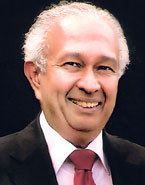He was tall and smart, with an athletic figure. He had a friendly disposition and an infectious smile. His simplicity was too good to be true, and least of all to be associated with an eminent orthopaedic surgeon.
He was at the height of his illustrious career, winning friends and admirers among his patients. He excelled in giving hope to the hopeless and bringing them out of difficult situations to live normal lives with his incredible touch and caring ways. He achieved everything he believed in – as a devout believer in God, a surgeon par excellence and a human being whose primary obligation was to serve mankind. That was Professor James Randunna Corea.
His life was snuffed out like a candle in the wind, and we Coreas have lost a tower of strength that was always there when needed. The end came just as he would have wanted – instantly, without any suffering. But to his wife Nalini and children Ranmali, Namali and Gemunu, it is an irreparable loss. All of us who were close to him banked on having Randunna around for many more years, and now we are all poorer as a result of his absence.
Randunna was a product of S. Thomas College, Mount Lavinia, where he acquitted himself well in studies and sports. His grandmother often spoke of her father, Dr. John Attygalle, who had many firsts in his list of achievements. He was the first Sinhalese to study western medicine and obtain the MRCS London and MD Aberdeen; the first Sinhalese Colonial Surgeon of Ceylon; the first Ceylonese to act as the Principal Civil Medical Officer, retiring in 1898. He was the author of “Materia Medica”, a book on the indigenous medical flora of Ceylon. To young Randunna, all this inspired him to take to medicine and qualify as a doctor. He was in the first medical batch at Peradeniya.
After passing out, his first appointment was in Kandy, where he met Nalini. When he proceeded to the UK to qualify further, Nalini followed. They got married and worked together towards realising Randunna’s dream of becoming an orthopaedic surgeon. Nalini in no small way gave Randunna all the support he needed towards achieving his goals and aspirations.
Having qualified as an orthopaedic surgeon, he was keen to return to Sri Lanka and serve in the land he loved so much, but was told he would have to start at the bottom, and that his seniority would not be taken into account. Disappointed, he left for Saudi Arabia. Many years later, when applying for a post at the Sri Jayewardenepura Hospital, he was asked to go through a viva, but no one more qualified than him could be found to conduct the viva, and as a result Sri Lanka lost his expertise yet again.
In the late ’80s, when he heard of the increasing number of scoliosis patients in Sri Lanka, he wrote to President Premadasa suggesting that the Government set up a surgical ward for scoliosis patients. This was done at the Sri Jayewardenepura Hospital, and for the first time treatment for scoliosis was introduced to Sri Lanka. The surgical operation to straighten crooked spines takes between 10 to 12 hours. An all-round surgeon, Randunna also did hip and knee replacements.
Randunna started his practice in Colombo, at his residence. His patients from the outstations would bring him gifts of fruits and vegetables in place of a fee. He never charged a fee for the poor and those known to him.
He was advised to tie up his medical practice with Nawaloka and Asiri hospitals and make his services available whenever he flew down to Sri Lanka.
He was also a Reserve Senior Superintendent of Police, and assisted DIG M. M. Guneratne in developing the Operating Theatre at the Police Hospital.
He once asked me whether I could refer poor patients for him to treat free of charge, whenever he visited Sri Lanka. Such a scheme was considered, in co-operation with the Lions Club, but it did not become a reality because the demand was overwhelming and Randunna’s stays in Sri Lanka were usually too short.
This example shows how little Randunna was interested in making money, and how much he enjoyed serving those who had implicit faith in him.
In recent years, Randunna spent much of his spare time doing voluminous research on the Corea family ancestry, an enthusiasm he clearly inherited from his parents, Henri and Claire. He was engaged in a novel project – to print the Corea family tree on fabric, using sophisticated printing techniques – when his efforts all ended so suddenly.
Gentlemen like Randunna are a God-given gift to mankind. I am personally aware of the countless times he waived his fee and reached out to those who could not afford to channel him but yet came to him. He magnanimously and cheerfully refunded consultation fees that had already been paid, because he cared deeply for his patients.
May his life be an inspiration to all who knew him.
By Sri Sangabo Corea | 
